| Listing 1 - 9 of 9 |
Sort by
|
Book
ISBN: 9155450008 9789155450007 Year: 2001 Volume: 63 Publisher: Uppsala Uppsala university library
Abstract | Keywords | Export | Availability | Bookmark
 Loading...
Loading...Choose an application
- Reference Manager
- EndNote
- RefWorks (Direct export to RefWorks)
Linguistics --- Frans (Taal) --- Franse taal --- Français (Langue) --- French language --- Reference (Linguistics) --- Référence (Linguistique) --- Verwijzing (Taalwetenschap) --- French philology --- Philologie française --- Festschrift - Libri Amicorum --- French philology. --- Philologie française --- Jonasson, Kerstin --- Grammar --- French literature --- History and criticism
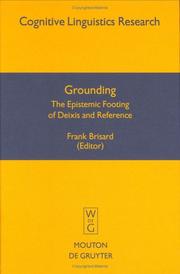
ISBN: 3110173697 3111856518 3110899809 9783110899801 9783110173697 Year: 2002 Volume: 21 Publisher: Berlin De Gruyter
Abstract | Keywords | Export | Availability | Bookmark
 Loading...
Loading...Choose an application
- Reference Manager
- EndNote
- RefWorks (Direct export to RefWorks)
This compilation of invited contributions, gathering an international collection of cognitive and functional linguists, offers an outline of original empirical work carried out in grounding theory. Grounding is a central notion in cognitive grammar that addresses the linking of semantic content to contextual factors that constitute the subjective ground (or situation of speech). The volume illustrates a growing concern with the application of cognitive grammar to constructions establishing deixis and reference. It proposes a double focus on nominal and clausal grounding, as well as on ways of integrating analyses across these domains.
Cognitieve spraakkunst --- Cognitive grammar --- Cognitive linguistics --- Grammaire cognitive --- Grammar [Cognitive ] --- Linguistique cognitive --- Psycholinguistique cognitive --- Reference (Linguistics) --- Référence (Linguistique) --- Spraakkunst [Cognitieve ] --- Verwijzing (Taalwetenschap) --- Linguistics --- Philosophy of language --- Comparative linguistics --- Grammar --- Pragmatics --- Cognitive grammar. --- Grammar, Comparative and general --- Deixis. --- Signification (Linguistics) --- Deixis (Linguistics) --- Deictic function --- Onomasiology --- Semantics --- Indexicals (Semantics) --- Psycholinguistics --- Grammar [Comparative and general ] --- Deixis --- Philology
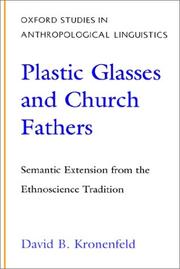
ISBN: 0195094085 Year: 1996 Volume: 3 Publisher: New York (N.Y.): Oxford university press
Abstract | Keywords | Export | Availability | Bookmark
 Loading...
Loading...Choose an application
- Reference Manager
- EndNote
- RefWorks (Direct export to RefWorks)
Lexicology. Semantics --- Ethnology. Cultural anthropology --- Sociolinguistics --- Anthropo-linguistics --- Anthropological linguistics --- Anthropologie du langage --- Anthropologie et linguistique --- Anthropologie linguistique --- Componential analysis in anthropology --- Ethnographie et linguistique --- Ethnolinguistics --- Ethnolinguistique --- Ethnolinguïstiek --- Ethnologie du langage --- Ethnologie et linguistique --- Ethnologie linguistique --- Langage--Anthropologie --- Langage--Ethnologie --- Language and ethnicity --- Langues--Anthropologie --- Langues--Ethnologie --- Linguistic anthropology --- Linguistics and anthropology --- Linguistique anthropologique --- Linguistique et anthropologie --- Linguistique et ethnographie --- Linguistique et ethnologie --- Linguistique ethnologique --- Reference (Linguistics) --- Référence (Linguistique) --- Semantics --- Semantiek --- Sémantique --- Sémasiologie --- Verwijzing (Taalwetenschap) --- Ethnoscience --- Formal semantics --- Semasiology --- Semiology (Semantics) --- Comparative linguistics --- Information theory --- Language and languages --- Lexicology --- Meaning (Psychology) --- Signification (Linguistics) --- Linguistics --- Onomasiology --- Indigenous knowledge systems --- Traditional knowledge systems (Ethnology) --- Ethnology --- Science --- Anthropology --- Language and culture
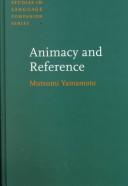
ISSN: 01657763 ISBN: 9027230498 1556199325 9786612162992 1282162993 9027298769 9781556199325 9789027230492 Year: 1999 Volume: 46 Publisher: Amsterdam Benjamins
Abstract | Keywords | Export | Availability | Bookmark
 Loading...
Loading...Choose an application
- Reference Manager
- EndNote
- RefWorks (Direct export to RefWorks)
The concept of 'animacy' concerns the fundamental and cognitive question of the extent to which we recognize and express living things as saliently human-like or animal-like.In Animacy and Reference Mutsumi Yamamoto pursues two main objectives: First, to establish a conceptual framework of animacy, and secondly, to explain how the concept of animacy can be reflected in the use of referential expressions. Unlike previous studies on the subject focussing on grammatical manifestations, Animacy and Reference sheds light upon the conceptual properties of animacy itself and its r
Psycholinguistics --- English language --- Grammar --- Japanese language --- Grammar, Comparative and general --- Reference (Linguistics) --- Animacy --- Grammar, Comparative --- Japanese. --- English. --- Référence (Linguistique) --- Verwijzing (Taalwetenschap) --- Grammar [Comparative and general ] --- Grammar [Comparative ] --- Japanese --- English --- Linguistique. (Collection) --- Taalwetenschap. (Reeks) --- English language -- Animacy. --- English language -- Grammar, Comparative -- Japanese. --- Grammar, Comparative and general -- Animacy. --- Japanese language -- Animacy. --- Japanese language -- Grammar, Comparative -- English. --- Reference (Linguistics). --- Philology & Linguistics --- Languages & Literatures --- Koguryo language --- Germanic languages --- Signification (Linguistics) --- Linguistics --- Onomasiology --- Semantics --- Philology --- Grammar, Comparative and general - Animacy --- English language - Animacy --- Japanese language - Animacy --- English language - Grammar, Comparative - Japanese. --- Japanese language - Grammar, Comparative - English. --- Animacy.
Book
ISBN: 2600003401 9782600003407 Year: 1999 Volume: 32 Publisher: Genève Droz
Abstract | Keywords | Export | Availability | Bookmark
 Loading...
Loading...Choose an application
- Reference Manager
- EndNote
- RefWorks (Direct export to RefWorks)
Lexicology. Semantics --- French language --- Grammar --- Reference (Linguistics) --- Référence (Linguistique) --- Verwijzing (Taalwetenschap) --- Français (Langue) --- Noun phrase --- Determiners --- Syntagme nominal --- Déterminants --- Grammar, Comparative and general --- Determiners. --- Noun phrase. --- 804.0-56 --- -Grammar, Comparative and general --- -Reference (Linguistics) --- Signification (Linguistics) --- Linguistics --- Onomasiology --- Semantics --- Comparative grammar --- Grammar, Philosophical --- Grammar, Universal --- Language and languages --- Philosophical grammar --- Philology --- Frans: syntaxis; semantiek --- Grammar, Comparative --- 804.0-56 Frans: syntaxis; semantiek --- Reference (Linguistics). --- Français (Langue) --- Déterminants --- Subject (Grammar) --- Determinatives (Linguistics) --- Determiners (Linguistics) --- Classifiers (Linguistics) --- Definiteness (Linguistics) --- Complex nominals --- Subject --- Nominals --- Grammar [Comparative and general ] --- Grammar, Comparative and general - Determiners. --- Grammar, Comparative and general - Noun phrase.
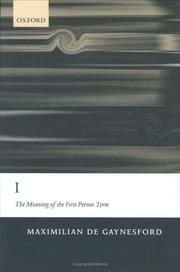
ISBN: 0199287821 9780199287826 0191603570 9786611154561 0191537047 1281154563 1423757343 Year: 2006 Publisher: Oxford Clarendon
Abstract | Keywords | Export | Availability | Bookmark
 Loading...
Loading...Choose an application
- Reference Manager
- EndNote
- RefWorks (Direct export to RefWorks)
Philosophy of language --- English language --- Grammar --- Identité personnelle --- Langage et logique --- Language and logic --- Personality --- Personality theory --- Personality traits --- Personnalité --- Personology --- Persoonlijkheid --- Raisonnement (Psychologie) --- Reasoning (Psychology) --- Redenering (Psychologie) --- Reference (Linguistics) --- Référence (Linguistique) --- Taal en logica --- Traits [Personality ] --- Traits de caractère --- Traits de personnalité --- Verwijzing (Taalwetenschap) --- Grammar, Comparative and general --- Signification (Linguistics) --- Linguistics --- Onomasiology --- Semantics --- Thought and thinking --- Personal identity --- Personality psychology --- Traits, Personality --- Psychology --- Individuality --- Persons --- Self --- Temperament --- Linguistics and logic --- Logic in language --- Language and languages --- Logic --- Person (Grammar) --- Person --- Philosophy --- Pronoun --- Verb --- Personality. --- Grammar [Comparative and general ] --- Philology
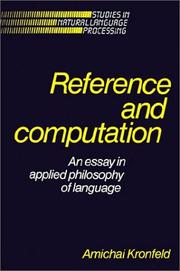
ISBN: 0521399823 0521366364 9780521399821 Year: 1990 Volume: vol *7 Publisher: Cambridge Cambridge University press
Abstract | Keywords | Export | Availability | Bookmark
 Loading...
Loading...Choose an application
- Reference Manager
- EndNote
- RefWorks (Direct export to RefWorks)
Lexicology. Semantics --- Philosophy of language --- Artificial intelligence. Robotics. Simulation. Graphics --- Mathematical linguistics --- Actes de parole (Linguistique) --- Automatic language processing --- Computational linguistics --- Computer linguistics --- Computerlinguïstiek --- Language and languages -- Data processing --- Language data processing --- Linguistics -- Data processing --- Linguistique -- Informatique --- Linguistique -- Traitement des données --- Linguistique computationnelle --- Linguistique informatique --- Linguistique informatisée --- Natural language processing (Linguistics) --- Reference (Linguistics) --- Référence (Linguistique) --- Speech acts (Linguistics) --- Taalhandelingen (Taalwetenschap) --- Taalwetenschap -- Gegevensverwerking --- Verwijzing (Taalwetenschap) --- Computational linguistics. --- Language and languages --- Actes de parole --- Langage et langues --- Philosophy. --- Philosophie --- --Langage --- --Philosophie --- --Intelligence artificielle --- --Reference (Linguistics) --- Philosophy --- Référence (Linguistique) --- Illocutionary acts (Linguistics) --- Speech act theory (Linguistics) --- Speech events (Linguistics) --- Linguistics --- Speech --- Signification (Linguistics) --- Onomasiology --- Semantics --- Applied linguistics --- Cross-language information retrieval --- Multilingual computing --- Data processing --- Languages - Philosophy. --- Langage --- Intelligence artificielle --- Language and languages - Philosophy
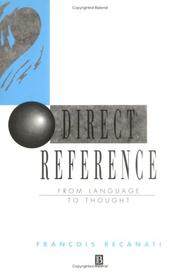
ISBN: 0631181547 0631206345 9780631181545 9780631206347 Year: 1997 Publisher: Oxford Blackwell
Abstract | Keywords | Export | Availability | Bookmark
 Loading...
Loading...Choose an application
- Reference Manager
- EndNote
- RefWorks (Direct export to RefWorks)
In this book Professor Recanati sets out to defend and systematize the much-discussed 'theory of Direct Reference', according to which the contribution made by a referential term (e.g. a proper name or demonstrative) to the proposition expressed by the sentence where it occurs is its reference. To deal with the objections traditionally levelled against the theory he puts forward a general account of de re thoughts and their communication which blends insights from both the Fregean and the Russellian traditions. In the second part of the book recent advances in pragmatics are presented and used to shed light on the referential/attributive distinction (with respect to both definite descriptions and indexicals) and belief reports. New treatments of some of the major topics in the philosophy of mind and language are offered along the way.
Language and languages --- Pragmatics. --- Psycholinguistics --- Reference (Linguistics) --- Reference (Philosophy) --- Thought and thinking. --- Philosophy. --- -Pragmatics --- Thought and thinking --- Mind --- Thinking --- Thoughts --- Educational psychology --- Philosophy --- Psychology --- Intellect --- Logic --- Perception --- Self --- Referring, Theory of --- Theory of referring --- Signification (Linguistics) --- Linguistics --- Onomasiology --- Semantics --- Language, Psychology of --- Psychology of language --- Speech --- Pragmalinguistics --- General semantics --- Logic, Symbolic and mathematical --- Semantics (Philosophy) --- Foreign languages --- Languages --- Anthropology --- Communication --- Ethnology --- Information theory --- Meaning (Psychology) --- Philology --- Psychological aspects --- Reference (Philosophie) --- Referentie (Filosofie) --- Verwijzing (Filosofie) --- Verwijzing (Taalwetenschap) --- Référence (linguistique) --- Référence (philosophie) --- Reference (Linguistics). --- Cognitive psychology --- Philosophy of language --- Psycholinguistics. --- Reference (Philosophy). --- Pensée --- Psycholinguistique --- Philosophie du langage --- Pragmatique --- Pragmatics --- Langage et langues --- Référence (Linguistique) --- Référence (Philosophie) --- Pensée --- Philosophie --- Pragmatique. --- Pensée. --- Psycholinguistique. --- Philosophie du langage. --- Language and languages - Philosophy. --- Sémantique
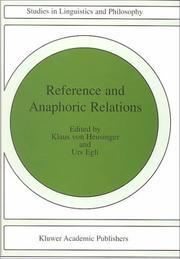
ISBN: 0792360702 1402002912 9401139474 Year: 2000 Volume: 72 Publisher: Dordrecht Kluwer
Abstract | Keywords | Export | Availability | Bookmark
 Loading...
Loading...Choose an application
- Reference Manager
- EndNote
- RefWorks (Direct export to RefWorks)
This book is a collection of original research articles on the representation and in terpretation of indefinite and definite noun phrases, anaphoric pronouns, and closely related issues such as reference, scope and quantifier movement. A variety of frame works for the formal analysis of discourse semantics are represented, including dis course representation theory, file change semantics, dynamic Logic, E-type theories, and choice function approaches, which was one of the main issues the Konstanz project were concerned with. All of these frameworks are couched in the tradition of Montague Grammar, even though they extend the classical formalism in different directions. The developments emerged from the modern discussion of problems for the representation of cross-sentential anaphoric relations involving pronouns, and the interpretation of definite and indefinite noun phrases. After a decade of controversy, these approaches are merging together, enriching each other's formal mechanisms rather than expressing opposition. Thus, the articles in this volume concentrate on fundamental semantic questions, and also extend the current formalisms in order to capture more data. The roots of this book lie in the workshop "Reference and Anaphoric Relations", which was held at the University of Konstanz in June 1996. Five main issues were discussed: (i) the Stoic and scholastic treatment of reference and anaphora; (ii) quan tification and scope, (iii) anaphoric reference; (iv) the representation of indefinite NPs with choice functions; and (v) the relation between linguistic expressions, their rep resentations and their meanings.
Reference (Linguistics) --- Anaphora (Linguistics) --- Definiteness (Linguistics) --- Grammar, Comparative and general --- Référence (Linguistique) --- Anaphore --- Définis (Linguistique) --- Quantificateurs (Linguistique) --- Quantifiers --- Anafoor (Taalwetenschap) --- Anaphore (Linguistique) --- Verwijzing (Taalwetenschap) --- Quantifiers. --- Definiteness (Linguistics). --- Reference (Linguistics). --- Philosophy of language --- Anaphora (Linguistics). --- Grammar [Comparative and general ] --- Semantics. --- Linguistics. --- Language and languages—Philosophy. --- Artificial intelligence. --- Theoretical Linguistics. --- Philosophy of Language. --- Artificial Intelligence. --- AI (Artificial intelligence) --- Artificial thinking --- Electronic brains --- Intellectronics --- Intelligence, Artificial --- Intelligent machines --- Machine intelligence --- Thinking, Artificial --- Bionics --- Cognitive science --- Digital computer simulation --- Electronic data processing --- Logic machines --- Machine theory --- Self-organizing systems --- Simulation methods --- Fifth generation computers --- Neural computers --- Linguistic science --- Science of language --- Language and languages --- Formal semantics --- Semasiology --- Semiology (Semantics) --- Comparative linguistics --- Information theory --- Lexicology --- Meaning (Psychology)
| Listing 1 - 9 of 9 |
Sort by
|

 Search
Search Feedback
Feedback About UniCat
About UniCat  Help
Help News
News